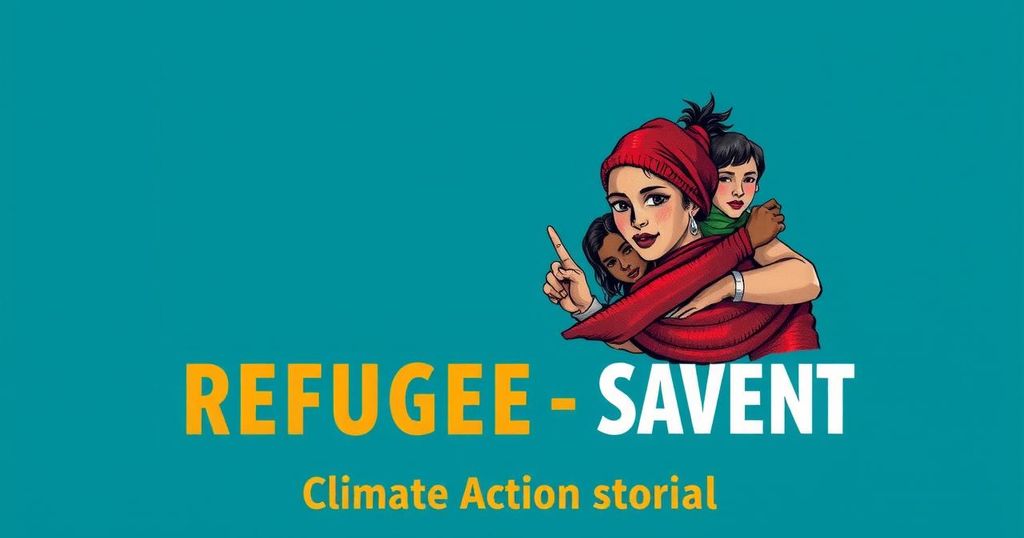The climate crisis disproportionately impacts refugees and their host communities, leading to severe conditions and vulnerabilities. A collaboration among Spotify, Coldplay, FC Barcelona, the FC Barcelona Foundation, and UNHCR is underway to plant trees in Ugandan refugee settlements, fostering reforestation and enabling young refugees to create eco-friendly building materials. This initiative combines sports with sustainable practices to address the challenges posed by climate change and displacement.
The impact of the climate crisis is acutely felt by refugees and those displaced due to conflict, as well as by the communities that host them. These groups find themselves increasingly ensnared in severe circumstances, often lacking viable options for relocation. To address this pressing issue, a noteworthy collaboration has been formed between Spotify, Coldplay, FC Barcelona, the FC Barcelona Foundation, and the UNHCR. This partnership aims to implement tree planting initiatives in Ugandan settlements where refugees reside, in addition to areas that accommodate these populations. The objective is to foster reforestation efforts in landscapes that have suffered from extreme drought conditions. Furthermore, the initiative will empower young refugees to introduce innovative solutions to tackle both the plastic waste crisis and the need for sustainable building materials. This involves collecting discarded plastics from their surroundings and repurposing them into durable, eco-friendly tiles. Since 2022, the collaboration between FC Barcelona, the FC Barcelona Foundation, and UNHCR has highlighted the transformative potential of sports. This partnership has engaged in efforts to provide sport for protection activities for individuals compelled to flee their homes, particularly focusing on refugee children and youth across various nations, including Colombia, Malaysia, Türkiye, El Salvador, and Uganda. In examining Uganda specifically, it is evident that the nation grapples with significant challenges stemming from both climate change and the displacement of individuals. Uganda is particularly susceptible to the impacts of climate change, which manifest as erratic rainfall patterns, recurrent droughts, floods, and seasonal forest fires. Moreover, climate-related phenomena further disrupt rainfall patterns, complicating agricultural planning and exacerbating food insecurity. Uganda currently accommodates over 1.7 million refugees hailing from South Sudan, the Democratic Republic of Congo, Burundi, and Somalia. Displaced individuals face heightened vulnerability to the adverse effects of climate change, which compounds their plight. The interplay of climate change and forced displacement imposes considerable strain on resources, intensifies existing tensions, and complicates the provision of requisite protection and assistance to both refugees and their host communities. To navigate these challenges, UNHCR actively coordinates and fosters climate action for refugees. This encompasses collaborations with partners and the private sector to meet the immediate needs of refugees while facilitating sustainable improvements. These efforts aim to strengthen vital services and reduce reliance on humanitarian aid, simultaneously fortifying communities against climate challenges and preparing them for future uncertainties.
The intersection of climate change and displacement presents a critical challenge, particularly affecting refugees and the communities that host them. As environmental conditions deteriorate, these populations are increasingly vulnerable, finding it difficult to adapt or relocate. This article focuses on a collaborative initiative led by high-profile organizations to address these issues through tree planting and sustainable practices in Uganda, a country facing both climate-induced challenges and hosting a significant refugee population. The strategic efforts of UNHCR and its partners aim not only to address immediate needs but also to promote long-term resilience amidst the climate crisis.
In conclusion, the collaboration between Spotify, Coldplay, FC Barcelona, the FC Barcelona Foundation, and UNHCR represents a proactive approach to addressing the twin challenges of climate change and forced displacement. By engaging in reforestation efforts and promoting sustainable practices among young refugees, this initiative not only seeks to mitigate the immediate impacts of the climate crisis but also fosters resilience and empowerment within affected communities. As Uganda hosts a considerable number of refugees contending with climate-related challenges, such multi-faceted efforts are crucial in securing their future and enhancing their capacity to adapt to ongoing changes in their environment.
Original Source: www.unhcr.org







